if引导的条件状语从句中考解析
知识点名:if引导的条件状语从句

知识点名:if引导的条件状语从句讲义:if引导的条件状语从句1. if意为“如果”,引导条件状语从句时,既可放在主句前面,也可放在主句后面。
若if条件句放在句首,从句后面常加逗号与主句隔开。
If you go there, I'll go, too.如果你去那儿,我也会去。
My mother will take me to the park if she is free.如果我妈妈有空,她就会带我去公园。
2. 时态运用:在含有if引导的条件状语从句的主从复合句中,主句为下列情形之一的,条件状语从句通常用一般现在时。
(1) 主句是一般将来时,即遵循“主将从现”的原则。
If he comes, he will bring his violin.如果他来,他就会把他的小提琴带来。
(2) 主句是含有情态动词may/might/can/must/should等的句子。
If you want to lose weight, you must eat less bread.如果你想减肥,你必须少吃面包。
(3) 主句是祈使句。
If you are not strong enough, please don't take part in such an activity.如果你不是很健壮,请不要参加这种活动。
3. 句型转换:(1) 借助“祈使句+and/or+陈述句(一般将来时)”这一句型来转换。
其中,在句意上and表示顺承;or表示转折,意为“否则”。
If you work hard, you'll pass the exam easily.=Work hard, and you'll pass the exam easily.努力学习,你将很容易通过考试。
Work hard, or you won't pass the exam easily.努力学习,否则你不会轻易地通过考试。
if引导的条件状语从句总结(精)
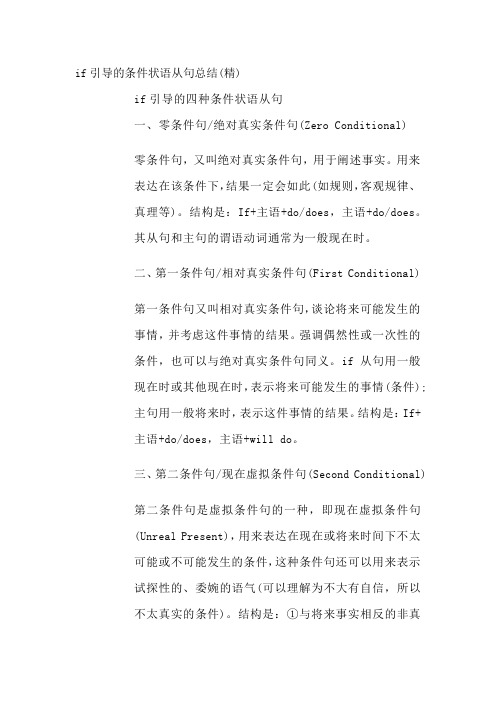
if引导的条件状语从句总结(精)if引导的四种条件状语从句一、零条件句/绝对真实条件句(Zero Conditional)零条件句,又叫绝对真实条件句,用于阐述事实。
用来表达在该条件下,结果一定会如此(如规则,客观规律、真理等)。
结构是:If+主语+do/does,主语+do/does。
其从句和主句的谓语动词通常为一般现在时。
二、第一条件句/相对真实条件句(First Conditional)第一条件句又叫相对真实条件句,谈论将来可能发生的事情,并考虑这件事情的结果。
强调偶然性或一次性的条件,也可以与绝对真实条件句同义。
if从句用一般现在时或其他现在时,表示将来可能发生的事情(条件);主句用一般将来时,表示这件事情的结果。
结构是:If+主语+do/does,主语+will do。
三、第二条件句/现在虚拟条件句(Second Conditional)第二条件句是虚拟条件句的一种,即现在虚拟条件句(Unreal Present),用来表达在现在或将来时间下不太可能或不可能发生的条件,这种条件句还可以用来表示试探性的、委婉的语气(可以理解为不大有自信,所以不太真实的条件)。
结构是:①与将来事实相反的非真实条件句是If+主语+should do/were to do/did,主语+would/should/could/might do;②与现在事实相反的非真实条件句是If+主语+did,主语+would/should/could/might+do。
四、第三条件句/过去虚拟条件句(Third Conditional) 第三条件句是表示与过去事实相反的虚拟语气,是用来表达如果(If)当时那样发生,另外一方面(当时)结果会如何。
通常是指过去的事情,带有一切已经太迟而不能够补救的意思。
结构是:If+主语+had done,主语+would/should/could/ might+have done。
if 条件句的时态搭配1.if从句用一般现在时,主句用一般将来时2.if从句用一般现在时,主句用may/might/canIf the fog gets thicker the plane may/might be diverted.3.if从句用一般现在时,主句用must/shouldIf you want to lose weight you must/should eat less bread.4.if从句用一般现在时,主句用一般现在时5.if从句用现在进行时,主句用一般将来时6.if从句用现在完成时,主句用一般将来时If you have finished dinner I’ll ask the waiter for the bill.。
If引导的条件状语从句知识讲解

2. 借助介词with 或without来转换。
例如: If you help me, I’ll finish my job soon.
W--i-t-h--y--o-u--r--h--e-l-p-, I’ll finish my job soon. 如果你帮我,我将很快完成我的工作。 If there is no water, fish may die.
• 2. 在if引导的条件状语从句中不能够使用some, 而要用any。
• 例如: If you have any questions to ask, please come to my office. 如果你有问题要问的 话,请到我办公室来。
1. if 在句中的含义不同 I want to know if he is a teacher.
3 If she ___d_o_e_s_n_’t_g_e_t____(not get ) up early , she’ll miss the early bus .
3. 时态要求上有区别
1.I want to know if there will be
a
sports meeting next month.
If 引导的宾语从句的时态由主句及本身时
态决定;
2.If it doesn’t rain , we’ll hold it.
If 引导条件状语从句的时态为一般现在时 记住“主将从现”
I won’t go there _____ I _____hear from you. I won’t go to the party if I am not invited. (同义句)
中考If引导的两种从句(宾语从句和条件状语从句) (4)
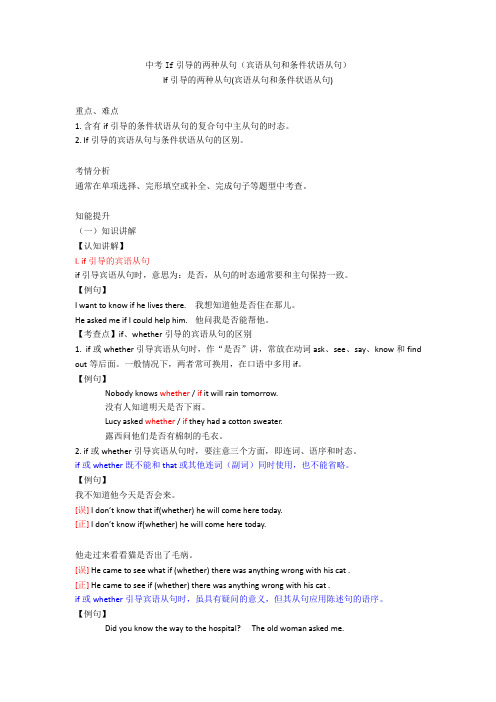
【例句】
我不知道他今天是否会来。
[误]I don’t know that if(whether) he will come here today.
[正]I don’t know if(whether) he will come here today.
如果明天下雨,我们就不去长城了。
(3)在if引导的条件状语从句中,当主句是一般将来时时,不能使用be going to结构,而要用will。
【例句】
I’ll help you with your English if I am free tomorrow.
如果明天我有空,我会帮助你学英语。
(4)在if引导的条件状语从句中不能使用some,而要用any。
他走过来看看猫是否出了毛病。
[误]He came to see what if (whether) there was anything wrong with his cat .
[正]He came to see if (whether) there was anything wrong with his cat .
如果你想去溜冰,穿上暖和的衣服。
如果主句是一般将来时,从句必须用一般现在时。
【例句】
You will be late for school if you get up late.
如果你起晚了,你上学将迟到。
If it rains tomorrow, we won’t go to the Great Wall.
我想知道它是不是好消息。
在介词后,只能用whether:
【例句】
His father is worried about whether he loseshis work.
初中英语语法-If引导的条件状语从句(讲解及练习)
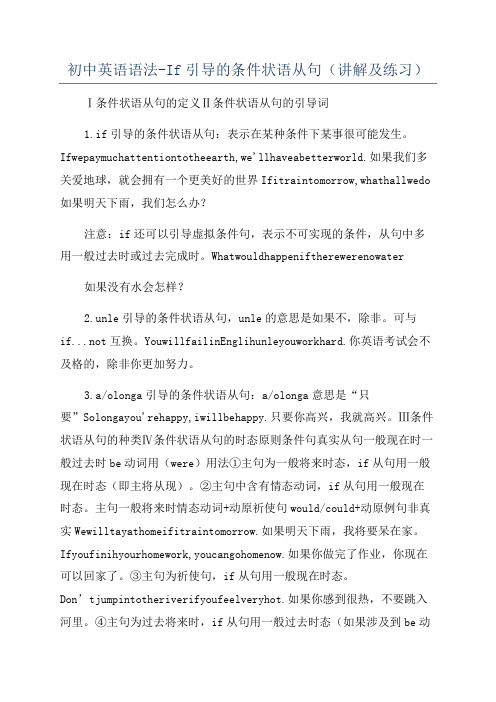
初中英语语法-If引导的条件状语从句(讲解及练习)Ⅰ条件状语从句的定义Ⅱ条件状语从句的引导词1.if引导的条件状语从句:表示在某种条件下某事很可能发生。
Ifwepaymuchattentiontotheearth,we'llhaveabetterworld.如果我们多关爱地球,就会拥有一个更美好的世界Ifitraintomorrow,whathallwedo 如果明天下雨,我们怎么办?注意:if还可以引导虚拟条件句,表示不可实现的条件,从句中多用一般过去时或过去完成时。
Whatwouldhappeniftherewerenowater 如果没有水会怎样?2.unle引导的条件状语从句,unle的意思是如果不,除非。
可与if...not互换。
YouwillfailinEnglihunleyouworkhard.你英语考试会不及格的,除非你更加努力。
3.a/olonga引导的条件状语从句:a/olonga意思是“只要”Solongayou'rehappy,iwillbehappy.只要你高兴,我就高兴。
Ⅲ条件状语从句的种类Ⅳ条件状语从句的时态原则条件句真实从句一般现在时一般过去时be动词用(were)用法①主句为一般将来时态,if从句用一般现在时态(即主将从现)。
②主句中含有情态动词,if从句用一般现在时态。
主句一般将来时情态动词+动原祈使句would/could+动原例句非真实Wewilltayathomeifitraintomorrow.如果明天下雨,我将要呆在家。
Ifyoufinihyourhomework,youcangohomenow.如果你做完了作业,你现在可以回家了。
③主句为祈使句,if从句用一般现在时态。
Don’tjumpintotheriverifyoufeelveryhot.如果你感到很热,不要跳入河里。
④主句为过去将来时,if从句用一般过去时态(如果涉及到be动词,一律都用were)。
初二英语状语从句中if引导的条件状语从句解析

初二英语状语从句中if引导的条件状语从句解析【考纲解读】1.掌握各种条件状语从句,如本文中的if引导的条件状语从句。
2. 正确使用各种状语及其时态。
3. 掌握条件状语中“主将从现”的用法。
【知识点梳理】引导条件状语从句最常用的连词是if,常见的if条件状语从句表示在某条件下,某事很可能发生,条件是可能存在的,主句中某种情况发生的概率也是很高的。
如:If you ask him,he will help you.如果你请他帮忙,他会帮你的。
If you fail in the exam,you will let him down.如果你考试不及格,你会让他失望的。
If you have finished the homework, you can go home.如果你作业做完了就可以回家了。
另外,if从句还表示不可实现的条件或根本不可能存在的条件,也就是一种虚拟的条件或假设。
从句多用一般过去时或过去完成时,表示对现在或过去的一种假设。
如:If I were you,I would invite him to the party.如果我是你,我会邀请他参加聚会。
I would have arrived much earlier if I had not been caught in the traffic.要不是交通堵塞,我本会来得早一些。
另外你还要注意if 条件句的时态搭配1.if从句用一般现在时,主句用一般将来时If he runs he’ll get there in time. 如果他用跑的,他就会及时赶到那儿。
The cat will scratch you if you pull her tail. 如果你拉猫的尾巴,它就会抓你。
2.if从句用一般现在时,主句用may/might/canIf the fog gets thicker the plane may/might be diverted. 如果雾在大一些,飞机可能就会改在别的机场降落。
if引导的条件状语从句讲解
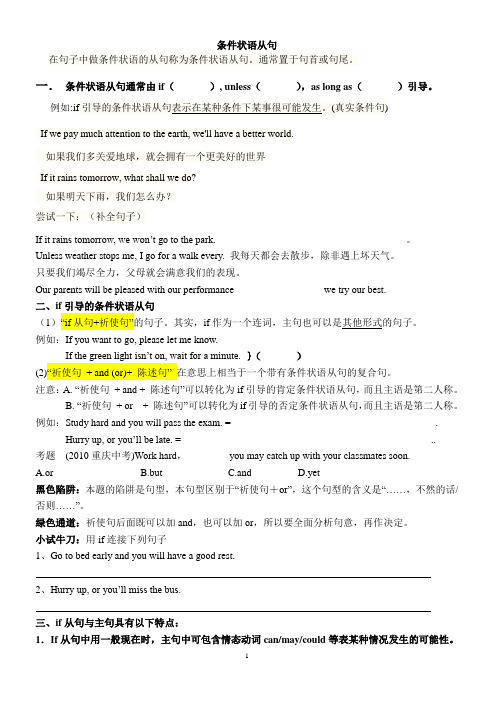
条件状语从句在句子中做条件状语的从句称为条件状语从句。
通常置于句首或句尾。
一.条件状语从句通常由if(), unless(),as long as()引导。
例如If we pay much attention to the earth, we'll have a better world.如果我们多关爱地球,就会拥有一个更美好的世界If it rains tomorrow, what shall we do?如果明天下雨,我们怎么办?尝试一下:(补全句子)If it rains tomorrow, we won’t go to the park.______________________________________。
Unless weather stops me, I go for a walk every. 我每天都会去散步,除非遇上坏天气。
只要我们竭尽全力,父母就会满意我们的表现。
Our parents will be pleased with our performance _____ _____ ______ we try our best.二、if引导的条件状语从句(1)“if从句+祈使句”的句子。
其实,if作为一个连词,主句也可以是其他形式的句子。
例如:If you want to go, please let me know.If the green light isn’t on, wait for a minute.}()(2)“祈使句+ and (or)+ 陈述句” 在意思上相当于一个带有条件状语从句的复合句。
注意:A. “祈使句+ and + 陈述句”可以转化为if引导的肯定条件状语从句,而且主语是第二人称。
B. “祈使句+ or + 陈述句”可以转化为if引导的否定条件状语从句,而且主语是第二人称。
例如:Study hard and you will pass the exam. =_________________________________________.Hurry up, or you’ll be late. =__________________________________________________..考题(2010重庆中考)Work hard,________ you may catch up with your classmates soon.A.orB.butC.andD.yet黑色陷阱:本题的陷阱是句型,本句型区别于“祈使句+or”,这个句型的含义是“……,不然的话/否则……”。
if引导的条件状语从句(讲义及解析)

if引导的条件状语从句(讲义及解析)状语用来表示行为发生的时刻、地点、目的、方式、程度等,通常由副词或介词短语充当,也可由一个句子充当。
I slept at home yesterday because I had a bad cold.状语从句状语从句指句子作状语。
依照其作用可分为时刻、地点、缘故、条件、目的、结果、让步、方式等从句。
状语从句一样由连词(从属连词)引导。
I will go to school by bike tomorrow if it is sunny.Grammar focus—I think I’ll take the bus to the party.—If you do, you’ll be late.If you take the bus to the party, you’ll be late.—I think I’ll stay at home.—If you do, you’ll be sorry.If you stay at home, you’ll be sorry.—What will happen if they have the party today?—If they have it today, half the class won’t come.—Should we ask people to bring food?—If we ask people to bring food, they’ll just bring potato chips and chocol ate.if 在本单元句中意为“;”,用于引导即 if 引导的是一个完整的句子,因此一定要有主谓,成为从句,另一个句子则成为主句。
If you go there, I’ll go, too.We will go hiking if it doesn’t rain tomorrow.If Bob leaves tomorrow, I will hold a party for him tonight.if 引导的条件状语从句既能够放在主句前,也可放在主句后。
总结好的:if引导的条件状语从句

总结好的:if引导的条件状语从句if引导的条件状语从句if1) ⽤法:(1)条件状语从句通常由连词if引导,意为“如果、假如”,主句不能⽤be going to表⽰将来,⽽应该⽤shall,will。
If you leave now, you are never going to regret it. (错误)If you leave now, you will never regret it. (正确)(2)if “如果”,引导条件状语从句,主句⽤⼀般将来时,从句则⽤⼀般现在时,如:If it rains tomorrow, I shan’t climb the hills.(3)另外,主句是祈使句或含有情态动词,从句也⽤⼀般现在时。
如:Please call me if he comes next Sunday.Can you call the policeman if you are in the trouble.注意宾语从句中的if与条件状语从句if的区别。
宾语从句中的if“是否”相当于whether,引导宾语从句,时态需根据语境确定。
如果主句⽤⼀般现在时,从句可以根据具体情况选⽤时态,如果主句⽤⼀般过去时,从句必须⽤过去式的某种形式。
I don't know if it will rain tomorrow. 我不知道明天是否会下⾬。
Our teacher said there was going to be a football match the next month.我们说下⽉将有场⾜球⽐赛。
【边学边做】⽤括号内所给词的正确形式填空。
1. What will you buy if you ________(have)a lot of money?2. If it ________(not snow)tomorrow, we will feel unhappy.3. You mustn’t go to school if you ________(be)still in bed.4. If he _______(be)at home at that time, he would know it.5. Please show me the way if you ________(know)it.6. You will hurt your teeth if you ________(eat)too much candy.7. If you gave me a toy car, I _________(be)very happy.8. I would get the prize if I _________(work)hard.9.If she ______ (finish ) work early ,she ______(go) home.10.If the weather______(be)fine,we_______(go)for a walk .11. If I_____(have) time tonight ,I _______(finish) the book I’m reading.12. If it ______(rain) next weekend , we_______(not be able to ) plant the vegetable .13. If it_______(rain),we______(stay) at home .14.If she______(arrive) ,she _____(phone) me .15. If he_____(call),tell him I’ll ring back .⼆、⽤所给词的适当形式填空1. If you ________(feel) tired, you _________ (have) to have a rest.2. Where _____ he ____(see) the film if he _________(have) time?3. If there ____ (be) fewer trees, there _______ (be) more pollution.4. He ___ (dress) more casually if he ___ (not work) on weekends.5. If Marcia _______ (live) alone, she _______ (keep) a pet parrot.6. Lana _____ (buy) a new dress if the old one ____ (be) out of style.7. The twins _______ (fight) if they__________ (argue).8. I ______ (have) a bake sale if I ____ (need) money for education.9. Peter ____ (send) me a beautiful souvenir if he ____(tour) Spain.10. If Mr. Green _______ (say) I am hard- working, my parents ___ (feel) glad.11. I ______ (go) to the beach if it________ (not rain) this week.12. _____they ___ (have) a match if the P.E. teacher __ (be) busy?13. He ____ (write) a letter to his grandparents if he ____ (get) his report card this week.14. If she ______ (get) up late, she _____ (not catch) the early bus.15. Peter ____ (major) in English if he ____(pass) the exams in Peking University.⼆、完成句⼦1. 他如果看电视太久了,他的⽗母会不⾼兴。
中考英语备课指导:If引导的两种从句(宾语从句和条件状语从句)
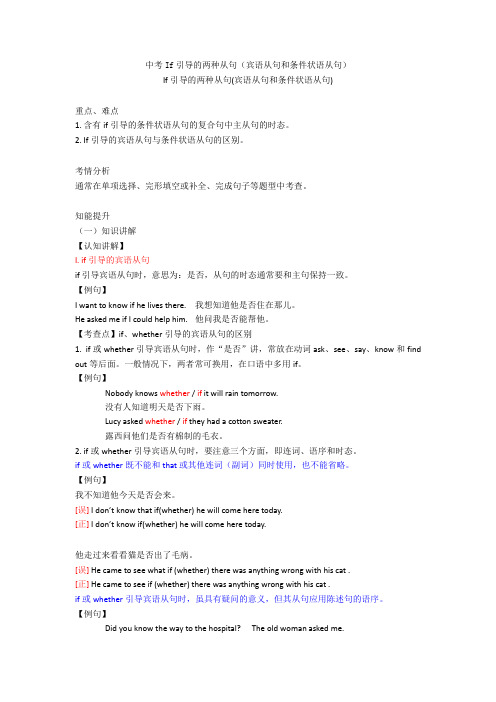
中考If引导的两种从句(宾语从句和条件状语从句)If引导的两种从句(宾语从句和条件状语从句)重点、难点1. 含有if引导的条件状语从句的复合句中主从句的时态。
2. If引导的宾语从句与条件状语从句的区别。
考情分析通常在单项选择、完形填空或补全、完成句子等题型中考查。
知能提升(一)知识讲解【认知讲解】I. if引导的宾语从句if 引导宾语从句时,意思为:是否,从句的时态通常要和主句保持一致。
【例句】I want to know if he lives there. 我想知道他是否住在那儿。
He asked me if I could help him. 他问我是否能帮他。
【考查点】if、whether引导的宾语从句的区别1. if或whether引导宾语从句时,作“是否”讲,常放在动词ask、see、say、know和find out等后面。
一般情况下,两者常可换用,在口语中多用if。
【例句】Nobody knows whether / if it will rain tomorrow.没有人知道明天是否下雨。
Lucy asked whether / if they had a cotton sweater.露西问他们是否有棉制的毛衣。
2. if或whether引导宾语从句时,要注意三个方面,即连词、语序和时态。
if或whether既不能和that 或其他连词(副词)同时使用,也不能省略。
【例句】我不知道他今天是否会来。
[误] I don’t know that if(whether) he will come here today.[正] I don’t know if(whether) he will come her e today.他走过来看看猫是否出了毛病。
[误] He came to see what if (whether) there was anything wrong with his cat .[正] He came to see if (whether) there was anything wrong with his cat .if或whether引导宾语从句时,虽具有疑问的意义,但其从句应用陈述句的语序。
初中if引导的条件状语从句用法

初中if引导的条件状语从句用法条件状语从句用于表示一个条件或前提,它通常由if引导。
条件状语从句通常指的是未来可能发生的事情,它与主句之间存在因果关系。
条件状语从句的基本结构是“if +条件句子,主句”。
其中条件句子可以是陈述句、祈使句或者问句。
例如:-如果你学习努力(条件句子),你会取得好成绩(主句)。
-倘若明天下雨(条件句子),我们就不去度假(主句)。
-要是他来了(条件句子),请告诉他我会晚点到(主句)。
以下是一些拓展用法:1.构造虚拟条件句子:虚拟条件句子用来表达与现实相反的假想情况。
主句的情态动词常常是“would”,而条件句中的动词需使用过去时态。
例如:-如果我有足够的钱(条件句子,现在假设),我就会买一辆新车(主句)。
-如果我能回到过去(条件句子,现在不可能),我会改变很多事情(主句)。
2.使用倒装结构:如果条件句以“had”或是“were”开头时,可以使用倒装结构。
例如:- Had I known you were sick(条件句子),I would have visited you(主句).- Were I taller(条件句子),I could reach the top shelf (主句).3.使用“unless”表示否定条件:除了使用“if”之外,我们也可以使用“unless”来引导否定条件状语从句。
例如:- Unless you study hard(条件句子),you won't pass the test(主句).- We won't have a picnic(主句)unless it stops raining (条件句子).总之,条件状语从句用于表示可能发生的条件情况,其语法结构为“if +条件句子,主句”。
拓展用法包括虚拟条件句子、倒装结构和使用“unless”来表示否定条件。
初中阶段if引导的从句及用法分析
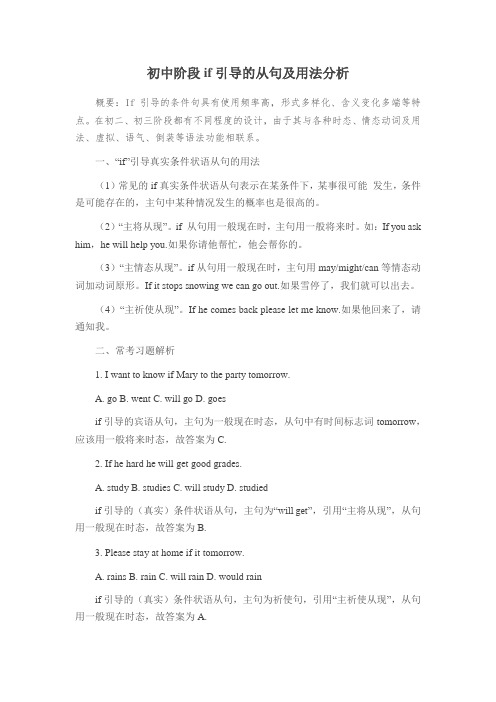
初中阶段if引导的从句及用法分析概要:If引导的条件句具有使用频率高,形式多样化、含义变化多端等特点。
在初二、初三阶段都有不同程度的设计,由于其与各种时态、情态动词及用法、虚拟、语气、倒装等语法功能相联系。
一、“if”引导真实条件状语从句的用法(1)常见的if真实条件状语从句表示在某条件下,某事很可能发生,条件是可能存在的,主句中某种情况发生的概率也是很高的。
(2)“主将从现”。
if 从句用一般现在时,主句用一般将来时。
如:If you ask him,he will help you.如果你请他帮忙,他会帮你的。
(3)“主情态从现”。
if从句用一般现在时,主句用may/might/can等情态动词加动词原形。
If it stops snowing we can go out.如果雪停了,我们就可以出去。
(4)“主祈使从现”。
If he comes back please let me know.如果他回来了,请通知我。
二、常考习题解析1. I want to know if Mary to the party tomorrow.A. goB. wentC. will goD. goesif引导的宾语从句,主句为一般现在时态,从句中有时间标志词tomorrow,应该用一般将来时态,故答案为C.2. If he hard he will get good grades.A. studyB. studiesC. will studyD. studiedif引导的(真实)条件状语从句,主句为“will get”,引用“主将从现”,从句用一般现在时态,故答案为B.3. Please stay at home if it tomorrow.A. rainsB. rainC. will rainD. would rainif引导的(真实)条件状语从句,主句为祈使句,引用“主祈使从现”,从句用一般现在时态,故答案为A.4.If he on smoking it may be very bad for his health.A. goB. goesC. will goD. wentif引導的(真实)条件状语从句,主句为“may be”,引用“主情态从现”,从句用一般现在时态,故答案为B.5.If I you I would give up smoking immediately.A. amB. wasC. wereD. likeif引导的非真实条件状语从句,主句为“would+动词原形”,从句要用一般过去时态,遇到be无论第几人称都用were故答案为B。
if引导的条件状语从句
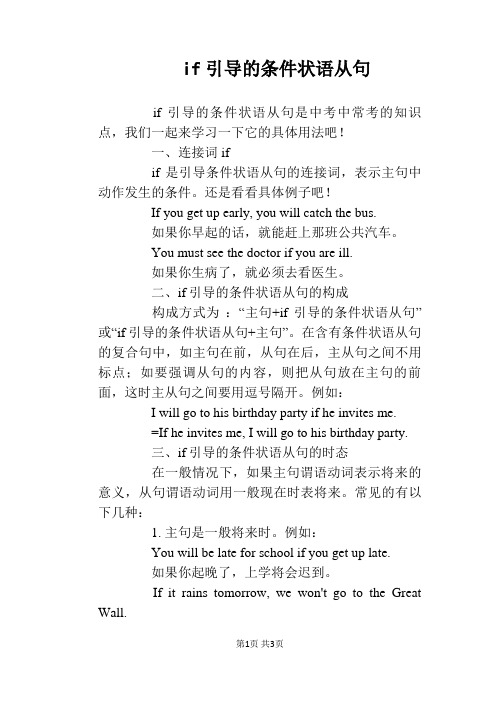
if引导的条件状语从句if引导的条件状语从句是中考中常考的知识点,我们一起来学习一下它的具体用法吧!一、连接词ifif是引导条件状语从句的连接词,表示主句中动作发生的条件。
还是看看具体例子吧!If you get up early, you will catch the bus.如果你早起的话,就能赶上那班公共汽车。
You must see the doctor if you are ill.如果你生病了,就必须去看医生。
二、if引导的条件状语从句的构成构成方式为:“主句+if引导的条件状语从句”或“if引导的条件状语从句+主句”。
在含有条件状语从句的复合句中,如主句在前,从句在后,主从句之间不用标点;如要强调从句的内容,则把从句放在主句的前面,这时主从句之间要用逗号隔开。
例如:I will go to his birthday party if he invites me.=If he invites me, I will go to his birthday party.三、if引导的条件状语从句的时态在一般情况下,如果主句谓语动词表示将来的意义,从句谓语动词用一般现在时表将来。
常见的有以下几种:1. 主句是一般将来时。
例如:You will be late for school if you get up late.如果你起晚了,上学将会迟到。
If it rains tomorrow, we won't go to the Great Wall.如果明天下雨,我们就不去长城。
2. 主句的谓语动词是want, hope, wish等词。
例如:I hope to visit her if I'm free.如果我有空,我希望去拜访她。
3. 主句的谓语动词含can, may, must等情态动词。
例如:If I finish my homework, I can watch TV.如果我完成了家庭作业,就可以看电视。
中考英语题型专题复习讲义if引导的条件状语从句

语法二:if引导的条件状语从句【语法示例】1.如果你去参加派对,你会玩的很开心!______you go to the party,you ______ have a great time!2.如果我们今天举办(聚会),一半的学生不会来。
______they have it today,half the class ______ come.3.如果你那样做,你将会很遗憾。
______ you do, you______be sorry. 【语法概述】在复合句中作条件状语的句子叫__________________.条件状语从句常用______ 来引导。
If 引导的条件状语从句表示假如______的动作发生,______的动作就(不)会发生。
【句子结构】If 引导的条件状语从句位置灵活,可直接放在主句后面,也可以放在句首。
放句首时,从句后面要用逗号和主句隔开。
1.主将从现:主句____________,从句____________。
①如果我有时间,我将会去看你。
I______ go to see you ______ I have time.②如果明天下雨,我们将待在家里。
______ it rains tomorrow, we______ stay at home.2.主情从现(may,might,can,must,should等):主句____________,从句____________。
如果你吃变质的食物,你可能会生病。
______ you eat bad food,you ______ be ill.3.主祈从现:主句____________,从句____________。
如果灯是红的,等一会儿。
______ the light is red,______ ______ a minute. 【同义句转换】1. 用“祈使句+and/ or+一般将来时的句子”转换。
and表顺承关系,or表否则。
中考英语考点:条件状语从句
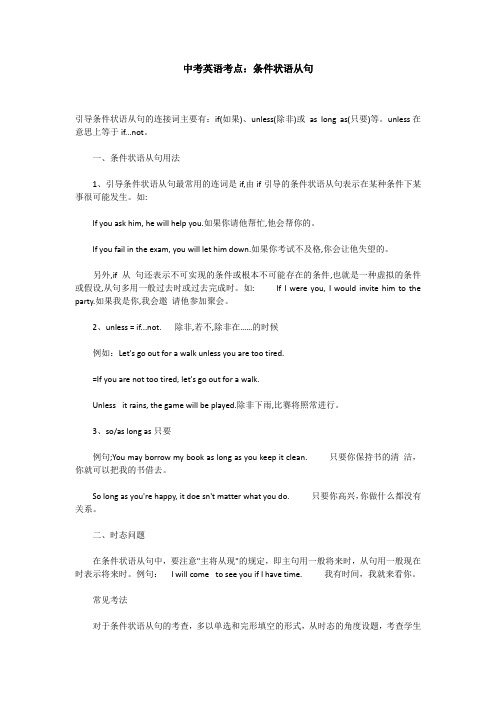
中考英语考点:条件状语从句引导条件状语从句的连接词主要有:if(如果)、unless(除非)或as long as(只要)等。
unless在意思上等于if...not。
一、条件状语从句用法1、引导条件状语从句最常用的连词是if,由if引导的条件状语从句表示在某种条件下某事很可能发生。
如:If you ask him, he will help you.如果你请他帮忙,他会帮你的。
If you fail in the exam, you will let him down.如果你考试不及格,你会让他失望的。
另外,if从句还表示不可实现的条件或根本不可能存在的条件,也就是一种虚拟的条件或假设,从句多用一般过去时或过去完成时。
如: If I were you, I would invite him to the party.如果我是你,我会邀请他参加聚会。
2、unless = if...not.除非,若不,除非在……的时候例如:Let's go out for a walk unless you are too tired.=If you are not too tired, let's go out for a walk.Unless it rains, the game will be played.除非下雨,比赛将照常进行。
3、so/as long as只要例句;You may borrow my book as long as you keep it clean. 只要你保持书的清洁,你就可以把我的书借去。
So long as you're happy, it doe sn't matter what you do. 只要你高兴,你做什么都没有关系。
二、时态问题在条件状语从句中,要注意"主将从现"的规定,即主句用一般将来时,从句用一般现在时表示将来时。
全面解析由if引导的条件状语从句

全面解析由if引导的条件状语从句 如果要认识条件状语从句,我们就有必要认识一下状语从句。
所谓的状语从句,就是在复合句中,由从句表示状语的句子。
而条件状语从句,一般就是由引导词unless或者if引导的状语从句。
今天,我们要说的条件状语从句,主要是从“if”的角度来说的。
if引导的条件状语从句: 通常来说,引导条件状语从句最常用的连词就是if。
if条件状语从句一般表示在某条件下,某事很可能发生,条件是可能存在的,主句中某种情况发生的概率也是相当高的。
例句:If we mingle with the crowd, we shall not be noticed. 如果我们混在人群里,就不会被注意到了。
They will allocate funds to you if you requisition it. 如果你提出书面申请,他们就会拨给你资金。
此外,if从句还表示不可实现的条件或者根本不可能存在的条件,也就是一种虚拟的条件或者假设。
从句多用一般过去时或者过去完成时,通常表示对现在或者过去的一种假设。
例句:I would have arrived much earlier if I had not been caught in the traffic.要不是交通堵塞,我本会来得早一些。
if 条件句的时态搭配: 1.如果if从句用一般现在时,主句则用一般将来时 例句:If she runs she’ll get there in time. 如果她用跑的,她就会及时赶到那儿。
2.如果if从句用一般现在时,主句则用may/might/can 例句:If it stops raining we can go out. 如果雨停了,我们就可以出去。
3.如果if从句用一般现在时,主句则用must/should 例句:If you want to lose weight you must/should eat less cake. 如果你想减肥,你必须少吃蛋糕。
if引导的条件状语从句中考解析
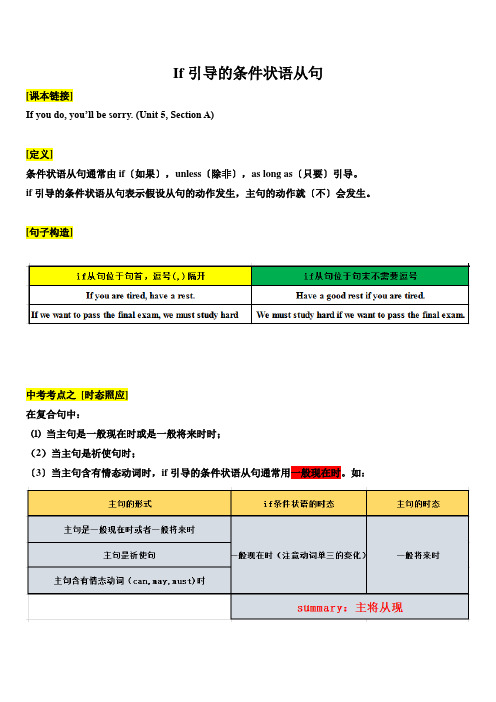
If引导的条件状语从句[课本链接]If you do, you’ll be sorry. (Unit 5, Section A)[定义]条件状语从句通常由if〔如果〕,unless〔除非〕,as long as〔只要〕引导。
if引导的条件状语从句表示假设从句的动作发生,主句的动作就〔不〕会发生。
[句子构造]中考考点之[时态照应]在复合句中:⑴当主句是一般现在时或是一般将来时时;(2)当主句是祈使句时;〔3〕当主句含有情态动词时,if引导的条件状语从句通常用一般现在时。
如:例句:If she doesn’t come, she will be sorry. 如果她不来,她会遗憾的。
Have a good rest if you are tired. 如果累了,你就好好休息一下。
We must study hard if we want to pass the final exam. 如果想通过期末考试,我们必须努力学习。
[同义句转换]1. If引导的条件状语从句可以用“祈使句,+and / or +一般将来时的句子〞转换。
祈使句,+and+陈述句可以转化为if 引导的肯定条件状语从句。
祈使句,+or+陈述句可以转化为if 引导的否认条件状语从句。
如:If you work hard, you’ll pass the exam easily. → Work hard, and you’ll pass the exam easily. 努力学习,你将很容易通过考试。
If you don’t hurry up, you’ll miss the train. → Hurry up, or you’ll miss the train. 快点儿,否那么你就赶不上火车了。
真题(2021重庆中考)Work hard,________ you may catch up with your classmates soon.课后练习:用if连接以下句子1、Go to bed early,and you will have a good rest.2、Hurry up, or you’ll miss the bus.2. 用含介词with或without的介词短语转换。
- 1、下载文档前请自行甄别文档内容的完整性,平台不提供额外的编辑、内容补充、找答案等附加服务。
- 2、"仅部分预览"的文档,不可在线预览部分如存在完整性等问题,可反馈申请退款(可完整预览的文档不适用该条件!)。
- 3、如文档侵犯您的权益,请联系客服反馈,我们会尽快为您处理(人工客服工作时间:9:00-18:30)。
If引导的条件状语从句[课本链接]If you do, you’ll be sorry. (Unit 5, Section A)[定义]条件状语从句通常由if(如果),unless(除非),as long as(只要)引导。
if引导的条件状语从句表示假如从句的动作发生,主句的动作就(不)会发生。
[句子结构]中考考点之[时态呼应]在复合句中:⑴当主句是一般现在时或是一般将来时时;(2)当主句是祈使句时;(3)当主句含有情态动词时,if引导的条件状语从句通常用一般现在时。
如:例句:If she doesn’t come, she will be sorry. 如果她不来,她会遗憾的。
Have a good rest if you are tired. 如果累了,你就好好休息一下。
We must study hard if we want to pass the final exam. 如果想通过期末考试,我们必须努力学习。
[同义句转换]1. If引导的条件状语从句可以用“祈使句,+and / or +一般将来时的句子”转换。
祈使句,+and+陈述句可以转化为if 引导的肯定条件状语从句。
祈使句,+or+陈述句可以转化为if 引导的否定条件状语从句。
如:If you work hard, you’ll pass the exam easily. → Work hard, and you’ll pass the exam easily. 努力学习,你将很容易通过考试。
If you don’t hurry up, you’ll miss the train. → Hurry up, or you’ll miss the train. 快点儿,否则你就赶不上火车了。
真题(2010重庆中考)Work hard,________ you may catch up with your classmates soon.A.orB.butC.andD.yet课后练习:用if连接下列句子1、Go to bed early,and you will have a good rest.2、Hurry up, or you’ll miss the bus.2. 用含介词with或without的介词短语转换。
如:If there is no water, fish can’t live. → Fish can’t live without water. 离开水,鱼不能生存。
[if引导的条件状语从句和宾语从句的区别]if可以用来引导宾语从句也可以用来引导条件状语从句,主要是要弄清if引导从句的时态。
if在引导宾语从句时,意为“是否”。
要根据实际情况来确定时态,并且一般将来时用will+ V.原形;而if在引导条件状语从句时意为“如果,假设”,要用一般时代替将来时,即“主将从现”。
e.g.I want to know if he will come here tomorrow.我想知道他明天是否到这儿来。
(if在上句引导的是宾语从句,从句中有很明显的表将来的时间状语tomorrow,所以if从句要用一般将来时。
)e.g.If it rains tomorrow, we’ll put off the sports meeting.如果明天下雨,我们就推迟运动会。
(if在上句引导的是条件状语从句,尽管从句中也有表将来时的时间状语tomorrow,从理论上讲也应该用一般将来时,但是在if引导的条件状语从句中要用一般现在时代替一般将来时,故从句谓语用rains而不用will rain. )典题分析1、(2010上海)We will have no water to drink we don’t protect the earth.A. untilB. beforeC. thoughD. if2、(2011 重庆)We will plant trees tomorrow, and I don’t know Tom will come and join us.A. ifB. whichC. whatD. where3、—Do you know if finished the work? —Not yet. If he , he will give me a call.A. he’s, will finishB. he’ll, finishesC. he’s , finishesD. he’ll , will finishHomework一、用if 连接下面的句子:1、 You do not understand the article. Ask your teacher.2、 You want to know more about it. Please call your teacher.3、Tell him to make a phone call to me. He will come here tomorrow.4、You want to go. Please tell me.5、Look at our website. The camera does not work.二、用所给的提示词组成一个if引导的条件状语从句。
1、 be tired, have a rest (Tom)2、 not go to bed early, feel sleepy (you)3、 become unhealthy, not eat vegetables (children)4、 not listen to the teacher, not study well (I )5、 fall behind others in studying, spend too much time on the games (Da Wei)三、单项选择:1. You are sure to pass the exam ___ you study hard.A. ifB. thoughC. thatD. since2. I'll go to see the film with you___I have time this evening.A. whetherB. soC. ifD. when3. ___ you study harder, you'll never pass the final exam.A. IfB. UntilC. UnlessD. Except4.We’ll stay at home if it ______ this afternoon.A.rain B.rains C.to rain D.raining5.We will go to the Great Wall if it ______tomorrow.A.won’t rain B.isn’t raining C.rained D.doesn’t rain6.—I don’t know if he ______.—He will come if it ______.A.comes; won’t rain B.will come; doesn’t rainC.comes; doesn't rain D.will come; won’t rain7.Do you know what time ______?A.the train leave B.does the train leaveC.will the train leave D.the train leaves8.Do you think if______ an English film tomorrow night?A.is there B.there is going to haveC.there is going to be D.will there be9.Will you please tell me ______?A.where Pudong Airport is B.how far Pudong Airport wasC.how can we get to Pudong Airport D.when was Pudong Airport built10.—Mike wants to know if______ a picnic tomorrow.—Yes. But if it ______, we’ll visit the museum instead.A.you have; will rain B.you will have; will rainC.you will have; rains D.will you have; rains11.—Why didn’t Nick come to school yesterday?—______ he was ill.A.After B.Where C.When D.Because12.This box is ______ heavy ______ I can’t carry it.A.too; to B.so; that C.very; that D.too; that13.I don’t know ______ he still lives here.A.where B.what C.when D.whether14. ---Do you know if he _______ to play basket ball with us?---I think he will come if he ______ free tomorrow.A. comes; isB. comes; will beC. will come; isD. will come; will be15. In the zoo if a child _____ into the water and can’t swim, the dolphins may come up ______ him.A. will fall; to helpB. falls; to helpC. will fall; helpD. falls; helping16.In the bookshop,a reader asked the shop keeper ___Who Moved My Cheese was an interesting book.A.thatB.howC.whatD.if17、I want to know ________ you have a brother.A.ifB.thatC.thoseD.them18、We will go hiking if it tomorrow.A.will be fineB.is fineC.be fineD. is gong to be fine19、Maybe you if you make some bad friends.A.go wrongB. will go wrongC.going wrongD. is going to be wrong20、—Do you know if finished the work?—Not yet. If he , he will give me a call.A. he’s, will finishB. he’ll, finishesC. he’s , finishesD. he’ll , will finish。
